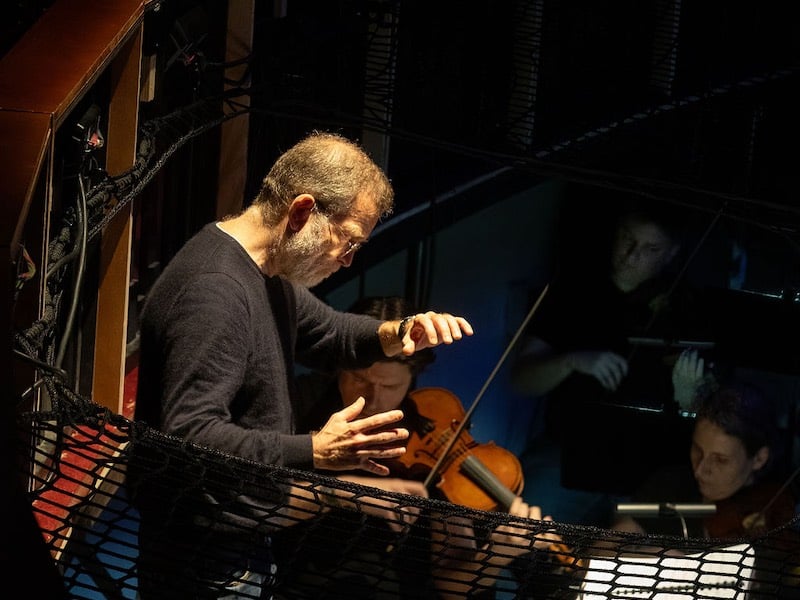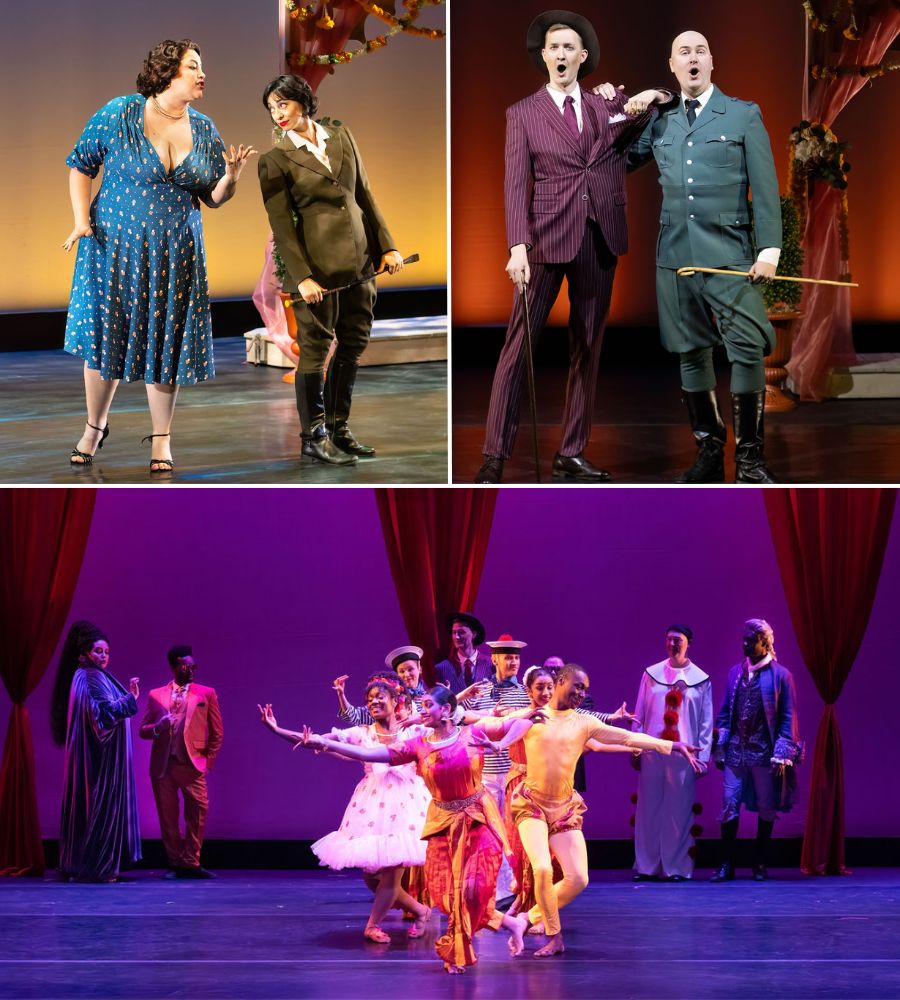Les Fêtes de Thalie was a challenging and provocative work when it premiered in Paris in 1714: so controversial were its central themes that composer Jean Joseph Mouret and librettist Joseph de La Font even issued a new epilogue two months later called “La critique des fêtes de Thalie.” This bonafide baroque clap-back critiqued its critics and challenged audiences to determine if dance, music, or written word was the best of the arts. Three centuries later, Opera Lafayette answers clearly: it’s music, at least in this production.
Thalie begins with Melpomene (Angel Azzarra), the muse of tragedy, listing the merits of theater, which can “soften hearts with tears and sighs.” Styled in the lush violet velvet and dramatic hairstylings of the typical opera diva, Melpomene is a stand-in for the tragédie en musique operas that dominated this era of French opera.

Enter Thalie (Paulina Francisco), muse of comedy, complete with rainbow hair and a studded pink leather jacket. She proclaims, “You offend Love by making him look so furious!” Thalie is the new guard, here to inform the mopey Melpomene that her operas are old-fashioned, irrelevant, unlike Thalie’s opéra-ballet, which emerged as a light-hearted and dance-filled alternative at the end of the 17th century.
Apollo (Jonathan Woody) enters, challenging them to prove or disprove the merits of comedy. Melpomene departs, and Thalie calls her ragtag ensemble of singers and dancers to the stage, as they prepare to tell the three tales of “La Fille” (The Girl), “La Veuve Coquette” (The Coquettish Widow), and “La Femme” (The Wife).
These three stories demonstrate the importance of comedy in opera with varying degrees of success, but the staging is secondary to the music. Conductor Christophe Rousset steals the show with his interpretation of this colorful score, vigorously guiding the Opera Lafayette Orchestra through a work that has rarely been heard since the 18th century. Opera Lafayette is at its best in the orchestra pit: their performance is rich, sumptuous, and bolstered by their use of period instruments, including a harpsichord masterfully commanded by Korneel Bernolet.
“La Fille” received the most laughs of the night. De La Font’s libretto boldly puts contemporary characters onstage, though this production keeps Thalie firmly in the past, first in an On the Town 1940s fever dream. “La Fille” — featuring sailors galore— depicts a daughter who is only convinced to marry her beau after he attempts to woo her mother instead. Hijinks ensue, and though a stereotypical comedy of errors, “La Fille” is a melodically compelling piece grounded by Patrick Kilbride’s turn as the flirtatious mother.
De La Font offers interpreters of his text many chances to take liberties and innuendo, particularly in the standout entrée “La Veuve Coquette.” The curtain opens on Isabel (Pascale Beaudin), a widow, enjoying the “sweet liberty of widowhood” in her 1930s-inspired fitted suit with riding boots and whip, equal parts Rachel Weisz in The Favourite and Katharine Hepburn in anything. This costuming by Marie Anne Chiment suggests this widow may not feel any attraction to men at all, delighting only in the company of her dear friend Doris (Angel Azzarra), but the staging and characterization stop just short of suggesting so despite the clear chemistry between Azzarra and Beaudin. Confusingly, this piece ends with Isabel’s suitors strolling off arm in arm rather than Isabel and Doris.

While “La Veuve Coquette” suffered from a noncommital interpretation of Thalie’s subtextual queerness, the dancing was at its best in this act. Choreographed by Anuradha Nehru and Pragnya Thamire, these five dancers brought much-needed levity and artistry to the piece and captured the best interpretation of opéra-ballet of the night. The direction resisted modernity, but the dancing embraced it, using percussive and expressive Kuchipudi dance to enliven the story.
The rest of the night featured another comedy of errors in “La femme” — this time at a classical era masquerade ball — before another delicious debate among the muses in “La critique.” Punctuated throughout were dances by members of the New York Baroque Dance Company and Kalanhidi Dance. In addition to the arts of music, word, and dance, Opera Lafayette’s meticulous attention to detail in history is worth praising and reading, particularly Rebecca Harris-Warrick’s dramaturgy on Thalie, which can be found here in the program and also on YouTube as part of Opera Lafayette’s salon series.
Thalie is a grand piece that, in another time, would have been performed with the fuller company of dancers and singers that its score and libretto demand, but this ensemble at Opera Lafayette holds its own.
Running Time: Approximately two hours and 30 minutes, including one intermission.
Mouret’s Les Fêtes de Thalie played May 3 and 4, 2024, presented by Opera Lafayette at The Kennedy Center’s Terrace Theater. Les Fêtes de Thalie has one more performance, in New York City on Tuesday, May 7, at 6:00 pm in El Museo del Barrio, 1230 Fifth Avenue. Pre-concert discussion at 5:00pm at El Café. Tickets can be purchased here. Full program here.




